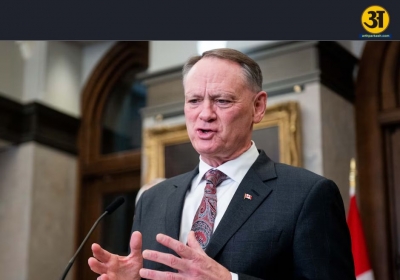
Wayanad hits lowest-ever voter turnout after Priyanka Gandhi's Election debut
Wayanad sees record low voter turnout in first election after Priyanka Gandhi’s debut
Wayanad, a parliamentary constituency in Kerala, witnessed a significant electoral event on Wednesday, as a by-election was held to fill the seat vacated by former MP Rahul Gandhi. The bypoll was set against a backdrop of emotional and physical challenges, particularly a deadly landslide earlier this year that had devastated the region. The voting recorded a remarkably low turnout of 64.72%, the lowest since the constituency’s creation in 2009. This reduced participation raised concerns about voter enthusiasm and engagement in the political process, especially considering the dramatic events that had unfolded just months earlier.
The landslide in Wayanad, which occurred earlier this year, left 231 people dead and 47 others still missing. The disaster, which caused widespread destruction in several villages, including Mundakkai, Chooralmala, and Attamala, had a profound emotional impact on the residents. In response, polling booths were set up in Meppadi to ensure that survivors from these affected areas could still cast their ballots. Despite the efforts to accommodate voters in the disaster-stricken areas, the low voter turnout remained a point of concern for political observers and leaders alike.
The Wayanad by-election saw Congress leader Priyanka Gandhi Vadra contesting for the first time in the constituency. She was running against CPI’s Sathyan Mokeri and BJP’s Navya Haridas. Priyanka’s candidacy was seen as a significant political move, especially since her brother Rahul Gandhi had vacated the seat after he decided to retain his Rae Bareli seat in Uttar Pradesh. The Congress camp had initially projected a resounding victory for Priyanka, with expectations of securing a majority of over 5 lakh votes. However, the actual turnout did not align with this optimistic forecast.
Low voter turnout and political campaigns
The voter turnout in Wayanad was notably low compared to other recent elections in the region, such as the Chelakkara assembly seat in Thrissur, which saw a turnout of 72.54%. Political leaders, particularly from the Congress party, dismissed concerns that the reduced voter participation would negatively affect Priyanka Gandhi’s prospects. According to reports, Congress leaders, including Mallikarjun Kharge, Rahul Gandhi, and Karnataka Deputy Chief Minister DK Shivakumar, played an active role in Priyanka’s campaign, supporting her in corner meetings and local outreach efforts.
The Kerala Pradesh Congress Committee (KPCC) also rallied behind Priyanka, organizing panchayat-level campaigns across Wayanad. AICC general secretaries KC Venugopal and Deepa Dasmuni were particularly instrumental in reaching out to voters at the grassroots level, while Congress MLAs were tasked with staying present during the campaign to ensure that Priyanka’s message reached as many voters as possible.
In contrast, the CPI(M)-led Left Democratic Front (LDF), which traditionally dominates the region, was facing a lack of enthusiasm from voters in areas that typically support their cause. VD Satheesan, the leader of the opposition in the state assembly, attributed the low voter turnout to a general apathy in CPI(M)-dominated regions. However, despite these challenges, Priyanka Gandhi’s campaign remained robust, with a focused effort to garner the support of voters who had been affected by the natural disaster earlier in the year.
Priyanka’s presence in the constituency was seen as a way to energize the party’s base, but the low turnout suggests that her message may not have resonated as strongly as expected. The Congress, however, maintained a positive outlook, confident that the reduced turnout would not significantly affect Priyanka’s prospects of securing the seat.
The emotional toll of the landslide disaster played a significant role in the reduced voter participation. For many residents, the trauma of losing loved ones and witnessing widespread destruction likely overshadowed the electoral process. In light of these circumstances, efforts were made to ensure that survivors and displaced voters could still participate in the election. Special arrangements were made to set up polling booths for these voters in areas such as Meppadi, which was more accessible to those affected by the landslide.
However, despite these efforts, the psychological impact of the disaster may have led many voters to feel disconnected from the election process. The loss of so many lives and the ongoing search for missing persons undoubtedly contributed to a general sense of disillusionment among the electorate. As a result, many residents may have prioritized their emotional healing and recovery over participating in the election.
The Congress party’s focus on securing a large margin of victory for Priyanka Gandhi also appeared to be at odds with the more somber mood in the constituency. While the party campaigned heavily for Priyanka, the overall response from voters was lukewarm, perhaps due to the overwhelming challenges posed by the natural disaster.
ALSO READ: Thick smog disrupts Flights in Delhi and Punjab as air quality worsens
A wider political context
The Wayanad by-election is not an isolated event but part of a larger political landscape in Kerala. The Congress party has been working hard to maintain its presence in the state, particularly after Rahul Gandhi vacated the Wayanad seat to focus on his political career in Uttar Pradesh. Priyanka Gandhi’s decision to contest in Wayanad marked her first significant political foray into the state, and it was expected to galvanize the Congress base.
Despite the lower-than-expected voter turnout, the Congress party remains hopeful that Priyanka’s campaign will yield positive results. The party’s internal surveys suggested that Priyanka’s popularity could secure a victory, despite the lower turnout figures. Party leaders were quick to downplay the significance of the turnout, asserting that it was not a reflection of Priyanka’s appeal or the party’s prospects in the region.
The BJP and CPI(M) were also monitoring the situation closely, with both parties vying for a stronger foothold in Kerala. The BJP, in particular, has been making inroads into the state, although its performance in Wayanad was not expected to be as strong as the Congress or CPI(M). The Left, which has traditionally been a dominant force in Kerala politics, was facing internal challenges and an energized Congress opposition led by Priyanka Gandhi.
The Wayanad bypoll results, which are set to be announced shortly, will be crucial for both the Congress and the other political parties in the state. For Congress, securing a win would be seen as a victory for Priyanka Gandhi and a boost to the party’s morale. It would also be a testament to Priyanka’s ability to connect with voters, even in the face of significant challenges like the landslide disaster.
For the Left and BJP, the results will be an indication of how well they are able to maintain their influence in Kerala, especially as both parties gear up for future elections. The low voter turnout may also serve as a wake-up call for political leaders to re-engage with the electorate and ensure that future elections are not marred by disillusionment or apathy.
In conclusion, the Wayanad by-election highlighted the complex interplay between natural disasters, voter engagement, and political campaigns. While the low turnout may have dampened the spirits of some, the results will likely offer valuable insights into the political dynamics of Kerala and the broader national political landscape.
As the results of the Wayanad bypoll are awaited, it is clear that the election has served as a barometer for both the Congress and its opponents. The challenges faced by the voters and candidates alike have brought the political landscape of Kerala into sharp focus. Moving forward, political parties will need to consider the impact of unforeseen events, like natural disasters, on voter behavior and engagement.





